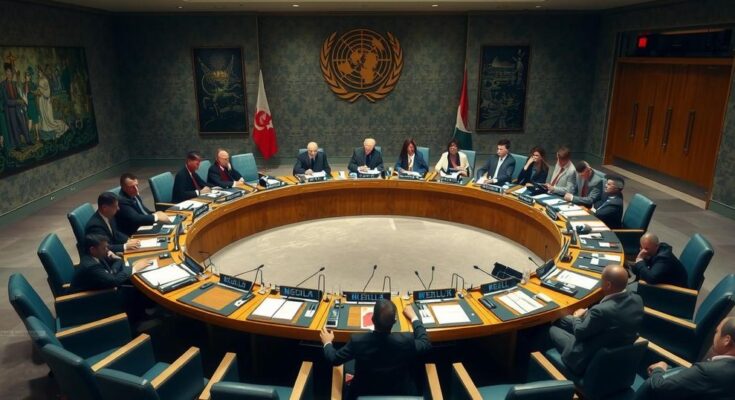The UN Security Council will convene to discuss Israel’s military strikes against Iran, which have escalated tensions in the Middle East. These actions prompted a complaint from Iraq regarding airspace violations. The ongoing conflict has resulted in significant casualties and calls for diplomatic intervention, including a proposal for a ceasefire by Egypt.
The United Nations Security Council is scheduled to convene an urgent meeting on Monday to address escalating tensions in the Middle East following Israel’s recent military action against Iran. The meeting was prompted by a request from Iran, supported by Algeria, China, and Russia. Iranian Foreign Minister Abbas Araqchi characterized Israel’s military actions as a serious threat to international peace and security, alleging that they further undermine an already unstable region. The Israeli strikes, which took place early Saturday, included multiple waves of air attacks on Iranian missile manufacturing sites. These attacks were reportedly a response to an earlier missile barrage from Iran towards Israel, consisting of approximately 200 ballistic missiles, amidst ongoing conflicts involving Iranian-backed groups such as Hamas and Hezbollah in Gaza and Lebanon. In his remarks, Iran’s Supreme Leader, Ayatollah Ali Khamenei, suggested that a measured response to the Israeli strikes is necessary, indicating that they should neither be exaggerated nor minimized, yet refraining from explicitly endorsing retaliation. Meanwhile, Israeli Prime Minister Benjamin Netanyahu asserted that the strikes successfully impaired Iran’s defense capabilities and its missile production potential. Prior to the UN meeting, Iraq lodged a formal complaint with the organization regarding Israel’s infringement upon its airspace during the recent attacks on Iran. An Iraqi government spokesperson condemned Israel’s actions as violations of Iraqi sovereignty. In addition to these developments, Israeli airstrikes were reported in southern Lebanon, resulting in the deaths of at least five individuals in Tyre, according to local health officials. In an attempt to mediate the ongoing conflict, Egyptian President Abdel-Fattah el-Sissi proposed a two-day ceasefire in the Israel-Hamas war, urging that it include the release of hostages by Hamas during this temporary halt in hostilities. El-Sissi emphasized the need for humanitarian relief for the Palestinian populace in Gaza amid the ongoing conflict. The latest regional turmoil was triggered by an October 7, 2023, assault by Hamas militants, which resulted in the deaths of 1,200 individuals and the capture of approximately 250 hostages in Israel. Israeli military responses in Gaza have reportedly resulted in around 43,000 Palestinian fatalities, according to figures released by the health ministry in the territory, which provides no distinction between combatants and civilians. In further diplomatic activities, Israel’s Mossad chief, David Barnea, traveled to Doha for discussions with Qatari Prime Minister Mohammed bin Abdulrahman Al Thani and U.S. CIA chief William Burns, in an effort to find avenues toward de-escalation amidst the ongoing violence. The situation remains fluid, with no apparent resolution in sight and escalating military actions underscoring the rising stakes in this highly volatile region.
The article discusses a significant escalation in conflict between Israel and Iran, culminating in military strikes that have prompted an emergency United Nations Security Council meeting. The background context includes an increase in hostilities following missile attacks exchanged between the two nations, alongside the broader implications these tensions have on regional stability, particularly concerning the roles played by Iranian proxy groups like Hamas and Hezbollah. Additionally, Egypt’s intervention and proposals for ceasefire efforts reflect the urgent need for diplomatic solutions amidst the violence.
In summary, the UN Security Council’s emergency meeting highlights the increasing tensions between Israel and Iran following recent strikes that have reignited fears of a broader regional conflict. The involvement of numerous nations, including Iraq’s complaints regarding sovereignty violations and Egypt’s proposal for a ceasefire, underscores the complexity of the situation. The continuing violence, marked by significant casualties on both sides, calls for urgent diplomatic efforts to restore peace and security in the region.
Original Source: www.voanews.com




